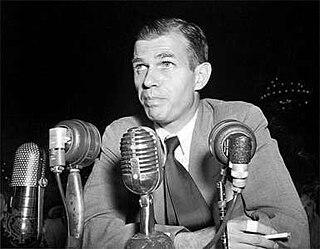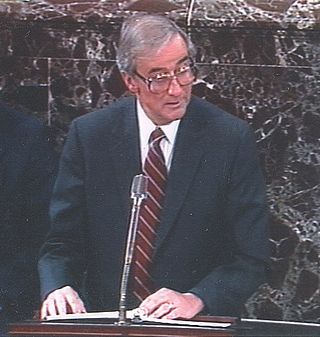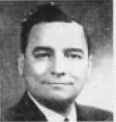Related Research Articles

John Edgar Hoover was an American law-enforcement administrator who served as the first Director of the Federal Bureau of Investigation (FBI). Calvin Coolidge appointed Hoover as director of the Bureau of Investigation, the predecessor to the FBI, in 1924. In June 1935, Hoover became instrumental in founding the FBI, where he remained director for 37 years until his death in May 1972. Hoover expanded the FBI into a larger crime-fighting agency and instituted a number of modernizations to policing technology, such as a centralized fingerprint file and forensic laboratories. Hoover also established and expanded a national blacklist, referred to as the FBI Index or Index List.

The Watergate scandal was a political scandal in the United States involving the administration of President Richard Nixon from 1972 to 1974 that led to Nixon's resignation. The scandal stemmed from the Nixon administration's attempts to cover up its involvement in the June 17, 1972 break-in of the Democratic National Committee headquarters in Washington, D.C. at the Watergate Office Building.

Alger Hiss was an American government official accused in 1948 of having spied for the Soviet Union in the 1930s. Statutes of limitations had expired for espionage, but he was convicted of perjury in connection with this charge in 1950. Before the trial Hiss was involved in the establishment of the United Nations, both as a US State Department official and as a UN official. In later life, he worked as a lecturer and author.

Julius Rosenberg and Ethel Rosenberg were an American married couple who were convicted of spying for the Soviet Union, including providing top-secret information about American radar, sonar, jet propulsion engines, and nuclear weapon designs. Convicted of espionage in 1951, they were executed by the federal government of the United States in 1953 at Sing Sing Correctional Facility in Ossining, New York, becoming the first American civilians to be executed for such charges and the first to be executed during peacetime. Other convicted co-conspirators were sentenced to prison, including Ethel's brother, David Greenglass, Harry Gold, and Morton Sobell. Klaus Fuchs, a German scientist working in Los Alamos, was convicted in the United Kingdom.

Deep Throat is the pseudonym given to the secret informant who provided information in 1972 to Bob Woodward, who shared it with Carl Bernstein. Woodward and Bernstein were reporters for The Washington Post, and Deep Throat provided key details about the involvement of U.S. president Richard Nixon's administration in what came to be known as the Watergate scandal. In 2005, 31 years after Nixon's resignation and 11 years after Nixon's death, a family attorney stated that former Federal Bureau of Investigation (FBI) Associate Director Mark Felt was Deep Throat. By then, Felt was suffering from dementia and had previously denied being Deep Throat, but Woodward and Bernstein then confirmed the attorney's claim.
William Perl (1920–1970), whose original name was William Mutterperl, was an American physicist and Soviet spy.

Walter Louis Nixon Jr. is a former United States district judge of the United States District Court for the Southern District of Mississippi who in 1989 was impeached by the House of Representatives and removed from office by the Senate. Because Nixon's impeachment was for perjury, the case was cited as a precedent in the impeachment trial of President Bill Clinton.

William Mark Felt Sr. was an American law enforcement officer who worked for the Federal Bureau of Investigation (FBI) from 1942 to 1973 and was known for his role in the Watergate scandal. Felt was an FBI special agent who eventually rose to the position of Deputy Director, the Bureau's second-highest-ranking post. Felt worked in several FBI field offices prior to his promotion to the Bureau's headquarters. In 1980, he was convicted of having violated the civil rights of people thought to be associated with members of the Weather Underground, by ordering FBI agents to break into their homes and search the premises as part of an attempt to prevent bombings. He was ordered to pay a fine, but was pardoned by President Ronald Reagan during his appeal.

Morton Sobell was an American engineer and Soviet spy during and after World War II; he was charged as part of a conspiracy which included Julius Rosenberg and his wife. Sobell worked on military and government contracts with General Electric and Reeves Instrument Corporation in the 1940s, including during World War II. Sobell was tried and convicted of espionage in 1951 and sentenced to 30 years in prison.
William Walter Remington (1917–1954) was an American economist who was employed in various federal government positions for the United States. His career was interrupted by accusations of espionage made by Elizabeth Bentley, a Soviet spy and defector.

Max Lowenthal (1888–1971) was a Washington, DC, political figure in all three branches of the federal government in the 1930s and 1940s, during which time he was closely associated with the rising career of Harry S. Truman; he served under Oscar R. Ewing on an "unofficial policy group" within the Truman administration (1947–1952).

The Director of the Federal Bureau of Investigation is the head of the Federal Bureau of Investigation, a United States' federal law enforcement agency, and is responsible for its day-to-day operations. The FBI director is appointed for a single 10-year term by the president of the United States and confirmed by the Senate. The FBI is an agency within the Department of Justice (DOJ), and thus the director reports to the attorney general of the United States.
Arthur Kinoy, was an American attorney and progressive civil rights leader who helped defend Ethel and Julius Rosenberg. He served as a professor of law at the Rutgers School of Law–Newark from 1964 to 1999. He was one of the founders in 1966 of the Center for Constitutional Rights in New York City, and successfully argued a number of cases before the Supreme Court of the United States. He also founded the Public Interest Law Center of New Jersey.
William A. Reuben was an American journalist and writer who focused on the Rosenberg and Hiss cases.

The Mundt–Nixon Bill, named after Karl E. Mundt and Richard Nixon, formally the Subversive Activities Control Act, was a proposed law in 1948 that would have required all members of the Communist Party of the United States register with the Attorney General.

Alexander Morton Campbell (1907–1968) was an Indiana lawyer who served in the United States Department of Justice as Assistant U.S. Attorney General for the Criminal Division, formally from August 1948 through December 20, 1949, under Tom C. Clark as U.S. Attorney General (1945–49).
Joseph Forer was a 20th-century American attorney who, with partner David Rein, supported Progressive causes, including discriminated communists and African-Americans. Forer was one of the founders of the National Lawyers Guild and its DC chapter. He was also an expert in the "Lost Laws" of Washington, DC, enacted in 1872–1873, that outlawed segregation at business places.
The DETCOM Program, along with the COMSAB Program formed part of the "Emergency Detention Program" (1946–1950) of Federal Bureau of Investigation (FBI). As FBI historian Athan Theoharis described in 1978, "The FBI compiled other lists in addition to the Security Index. These include a "Comsab program", and "Detcom program", and a Communist Index

Miriam Ruth Moskowitz was an American schoolteacher who served two years in prison after being convicted for conspiracy as an atomic spy for the Soviet Union.
David Rein (1914–1979) was a 20th-Century American attorney who, with partner Joseph Forer, supported Progressive causes including the legal defense of African-Americans and accused Communists. Rein and Foyer were members of the National Lawyers Guild and its D.C. chapter. Rein represented "more than 100 people", alleged to have been Communists, before the House Un-American Activities Committee (HUAC) and the subcommittee of the Senate Committee on Administration.
References
- 1 2 3 4 5 6 7 8 9 "Raymond L. Wise, 91, Dies; Former Director of A.C.L.U." The New York Times. 8 July 1986. Retrieved 1 April 2017.
- 1 2 "FBI Records: The Vault: William Perl Part 02 of 23". Federal Bureau of Investigation. Retrieved 23 July 2017.
- 1 2 "(Search on "Perl" + "Raymond Wise"". Federal Bureau of Investigation. Retrieved 23 July 2017.
- ↑ Volan, William H. (16 March 1951). "Perl Enters Not Guilty Plea; Bail Sate at $20,000 by Court". Columbia Spectator. Retrieved 24 July 2017.
- ↑ Neville, John F. (1995). The Press, the Rosenbergs, and the Cold War. Greenwood Publishing Group. p. 160. ISBN 9780275949952 . Retrieved 24 July 2017.
- ↑ Radosh, Ron; Milton, Joyce (1997). The Rosenberg File . Yale University Press. pp. 205. ISBN 0300072058 . Retrieved 23 July 2017.
- 1 2 3 "FBI Records: The Vault: William Perl Part 03 of 23". Federal Bureau of Investigation. Retrieved 23 July 2017.
- ↑ "FBI Records: The Vault: William Perl Part 04 of 23". Federal Bureau of Investigation. Retrieved 23 July 2017.
- ↑ "FBI Records: The Vault: William Perl Part 07 of 23". Federal Bureau of Investigation. Retrieved 23 July 2017.
- ↑ "FBI Records: The Vault: William Perl Part 08 of 23". Federal Bureau of Investigation. Retrieved 23 July 2017.
- ↑ "FBI Records: The Vault: William Perl Part 09 of 23". Federal Bureau of Investigation. Retrieved 23 July 2017.
- 1 2 Wise, Raymond L. (8 July 1986). "Letters: The Mundt-Nixon Bill: Unconstitutionality of Pending Legislation is Charged". The New York Times. Retrieved 1 April 2017.
- ↑ Wise, Raymond L. (December 1965). "Veto Cannot Bar U.N. General Assembly from Establishing a Peacekeeping Force". ABA Journal. pp. 1, 180–1, 184. Retrieved 24 July 2017.
- ↑ Wise, Raymond L. (January 1971). "On World Disarmament". ABA Journal. p. 4. Retrieved 24 July 2017.
- ↑ Wise, Raymond L. (January 1978). "Nixon Pardon". ABA Journal. pp. 16, 18. Retrieved 24 July 2017.